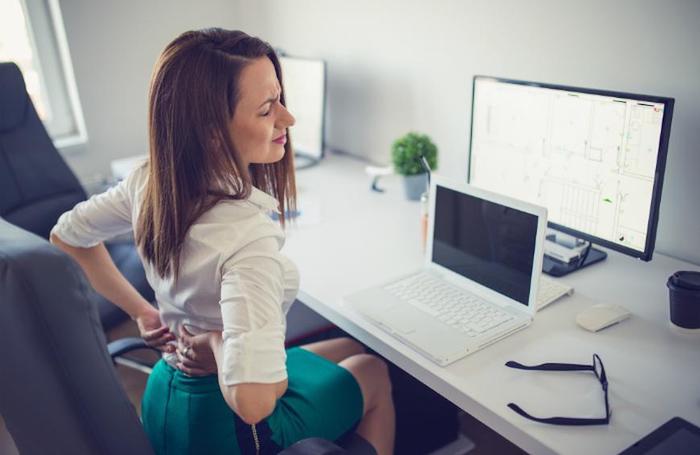
Herniated disc pain in your lower back can range from a mild ache to a shock-like pain that radiates into your leg. While most herniated discs gradually start to feel better within a few weeks, many common activities may inflame and worsen the pain. Here are a few activities to avoid.
Sitting Too Much
Sitting puts more stress on your spinal discs, especially when slouching forward in a seat. To minimize pain from a herniated disc in the lumbar spine (lower back), try to stand up, move around, or lie down when possible.
Since sitting is often unavoidable, try these tips to reduce the load placed on your lumbar spine.
- Sit up straight with your shoulders rolled back towards the chair and shoulder blades down.
- Keep thighs about horizontal with the floor (hips should not be lower than your knees).
- Use a small pillow or rolled-up towel to support your lower back.
- Set a reminder on your phone to take breaks often and walk short distances.
If your job requires long hours at a desk or computer, consider using a sit-stand desk which allows you to stand intermittently throughout the day.
Doing Laundry
Between bending down to pick up clothes, carrying a heavy basket, and reaching for various items, doing laundry puts a lot of pressure on your lower back. If possible, ask a friend or family member to help carry out this task until your back feels better. Many dry cleaners also offer a regular laundry service.
Vacuuming
The repetitive forward-lunging motion typically used to vacuum the floor can irritate your herniated disc. Instead of extending your arm and bending your back, keep your back straight and walk the vacuum across the floor. Think of your legs doing the work instead of your arms. Another option would be to buy a robot vacuum cleaner to do the work for you. With this device, you can set it and forget it.
Feeding A Pet
It may seem like a simple task, but bending down to fill your pet’s bowl with food and water is enough to cause a painful flare-up. If you’re unable to delegate this responsibility to someone else, purchase a specialty pet bowl equipped with an extended tube or built-in reaching aid. If you must lean over, keep one leg extended as a golfer would while picking up a golf ball—this takes stress off the lower back by keeping your alignment straight.
Strenuous Exercise
While exercise is still recommended, avoid high-impact activities or other movements that place too much stress on your spinal discs.
- Stay away from activities that cause repetitive loading on your lower back, such as running or jumping rope.
- Skip movements that involve significant axial loadings on the lower back, such as squats and leg presses.
- Avoid toe-touches, sit-ups, and yoga poses that worsen the pain and lead to significant bending of the back.
Instead, try aerobic exercises, such as swimming and walking. Using a stationary bike can be an excellent source of exercise while recovering from a herniated disc. Hiking, especially up hills, can also be good. Aerobic exercise increases the flow of blood, nutrients, and oxygen to the soft tissue in the back, which can improve healing and reduce pain. You can also try strengthening exercises approved by your doctor or physical therapist.
Low-impact exercises are generally easy and can be done on a regular basis. If these exercises are still uncomfortable, try aquatic therapy by simply walking in a pool. The buoyancy of the water helps reduce pain during joint movements. Some evidence suggests that aquatic therapy may also help improve functioning in the lower back.
Shoveling Snow or Gardening
Shoveling snow and gardening can worsen your disc pain, as it often involves heavy lifting, forward-bending, and twisting—motions that easily aggravate your discs. With snow, use a snowblower if you can, or get help from a neighbor. With gardening, try to avoid repetitive bending and stooping. Instead, stay in one position and vary your posture. If it is painful, the garden will have to wait another week. Giving yourself time to heal will allow you to be more independent in the long run.
Commit to using a good, supportive posture to help relieve pressure on your spinal discs and nerves. If your back pain does not resolve with these tips and techniques, call your doctor or health care provider.
Precision Pain Care and Rehabilitation has two convenient locations in Richmond Hill – Queens and New Hyde Park – Long Island. Call the Richmond Hill office at (718) 215-1888, or (516) 419-4480 for the Long Island office, to arrange an appointment with our Interventional Pain Management Specialist, Dr. Jeffrey Chacko.













